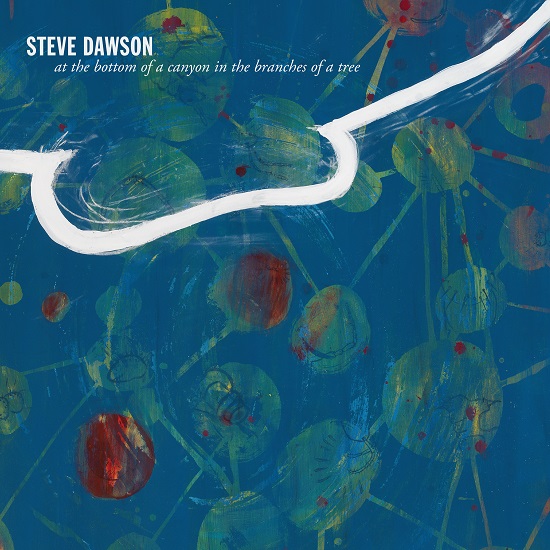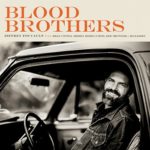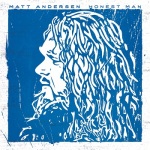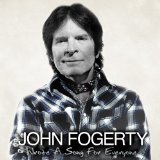
You can’t deny that the last couple of years have been difficult times for musicians, but the creative impulse won’t be stifled. Artists will take the clay that’s available and use it to fashion their creations. The Trump years spawned many memorable albums, then musicians found different ways of working through a pandemic with very little personal interaction to help the process. Steve Dawson’s raw material for “At the Bottom of a Canyon in the Branches of a Tree” came from a different place. Following a family tragedy, he took an extended sabbatical to decide whether he wanted to continue writing and performing. A songwriting retreat with Richard Thompson and Patty Griffin gave him the answer he needed and he found his clay (mainly) in his own personal experiences.
The album’s quite unusual in that it’s almost entirely the work of Steve Dawson; there are no co-writes or covers and only three other musicians make cameo appearances. Apart from Alton Smith’s piano on a couple of songs, Michael Miles’ banjo on “The Spaces In Between” and a Diane Christiansen vocal on “We Are Walking in a Forest”, every hook, lick and vocal is Steve Dawson. Quite apart from the instrumental versatility, showcases Steve’s vocal range from the easy, languid tenor into high falsetto. Steve’s voice evokes the classic American west coast country rock bands, sounding at times like Don Henley or Randy Meisner and there’s the occasional nod in the direction of Jackson Browne as the album pulls off the trick of sounding vaguely familiar while constantly introducing new ideas and sounds.
The settings for the songs are pretty laid-back, with nods towards sixties/seventies soul in “This Is All There Is”, psychedelia in “Beautiful Mathematics”, Crazy Horse in the title track and Jackson Browne on “Hard Time Friend”, which has a breakdown and restart two-thirds of the way through that feels a lot like the last section of JB’s “The Late Show” (one of Springsteen’s favourite recorded moments). The musical settings are incredibly varied, with some interesting keyboard instruments appearing (mellotron and dulcimer for a start), creating the perfect ambience for each of the songs.
The album could easily have been a fairly depressing experience, with songs about COVID deaths and forced positivity (“This Is All There Is”), dysfunctional families (“She Knew”) and the limitations of the forgiving gesture (“Forgiveness is Nothing Like I thought it Would Be”), but Steve leavens the mixture with the resoundingly upbeat “22 Rubber Bands”, a song about his love for his daughter, and “Hard Time Friend”, dedicated to his friend Diane Christiansen, celebrating the friends who are with us through times that are good or bad, happy or sad. There are two bonus CD and download songs which didn’t make the vinyl cut for reasons that have nothing to do with quality; “You’re Trying Too Hard”, which nails fake authenticity, and “However Long it Takes”, a reminder that we can always choose to see the good things in the world rather than the negativity which so often surrounds us.
Twelve tracks, fourteen if you buy the CD or download, and each one with an interesting arrangement and lyrics conveying ideas that are important to Steve Dawson, as they should be to all of us. It’s ironic to think that this bunch of songs were created by someone who had started to doubt his creative abilities.
“At the Bottom of a Canyon in the Branches of a Tree” is released on Pravda Records (PR6419) on Friday July 16th.
Here’s the animated video for “22 Rubber Bands”:
 “Blood Brothers” has a very familiar sound; it’s the sound of 1970s Laurel Canyon. That’s not a criticism; the Canyon was a creative hub in the seventies California music scene and it’s no coincidence that Don Henley, a member of that scene covers Jeffrey Foucault’s songs in his live sets. The arrangements and stylings all have the feel of those classic Elektra/Asylum albums of the early 70s. Jeffrey Foucault also has a voice that’s straight out of that era with hints of Randy Meisner and Jackson Browne in there. And, like those albums, the musicianship is of the highest quality while being largely understated. No flash, just perfect settings that allow the ten songs to breathe and shine. And the whole thing was recorded directly to tape over three days in Pachyderm Studios in Minnesota.
“Blood Brothers” has a very familiar sound; it’s the sound of 1970s Laurel Canyon. That’s not a criticism; the Canyon was a creative hub in the seventies California music scene and it’s no coincidence that Don Henley, a member of that scene covers Jeffrey Foucault’s songs in his live sets. The arrangements and stylings all have the feel of those classic Elektra/Asylum albums of the early 70s. Jeffrey Foucault also has a voice that’s straight out of that era with hints of Randy Meisner and Jackson Browne in there. And, like those albums, the musicianship is of the highest quality while being largely understated. No flash, just perfect settings that allow the ten songs to breathe and shine. And the whole thing was recorded directly to tape over three days in Pachyderm Studios in Minnesota.
The opening song “Dishes” sets the tone for the album lyrically and musically. It’s gentle, laid-back and extols the virtues of domestic simplicity, whereas the second song, the apocalyptic, end-of-days “War on the Radio” is less typical. It has a country-rock feel with more of an emphasis on the rock, and is driven along by fiddle fills as we look into the abyss.
The rest of the album has the same DNA as “Dishes”, gentle arrangements pulling out the best in stories of domesticity in small-town America peopled with the characters that we can all relate to: the frustrated singer-songwriter in ”Cheap Suit” and the father looking back at his wedding day (with the album’s second reference to washing dishes) in “Little Warble”, with its clever lyrical device of ‘warble’ appearing at the start of the song in relation to the car’s tape player and at the end in relation to the singer’s heartbeat.
“Little Warble” has a country feel, while the rest of the album is Elektra/Asylum (you’d swear David Lindley was there) apart from the Neil Young-tinged “Blood Brothers” and “Rio” which is pure “Harvest Moon” with picked guitar, drums with brushes and pedal steel. If you’re a fan of the Eagles/Jackson Browne school of music, then you’re probably going to enjoy this album.
“Blood Brothers” is out now on Blueblade Records (BB-006).
 Buford Pope’s American influences shine through on “The Waiting Game”. His introduction to American music was Bob Dylan but the most obvious comparison vocally is the high register vocals of Neil Young. There’s a reference in the album’s second song, “Hey Hey Aha”, to the difficulties of songwriting (and a subtle nod to Shakey again) and writer’s block, but the songs all worked out fine in the end and the calling card for “The Waiting Game” is the way they have been arranged. And that’s apparent from the very start.
Buford Pope’s American influences shine through on “The Waiting Game”. His introduction to American music was Bob Dylan but the most obvious comparison vocally is the high register vocals of Neil Young. There’s a reference in the album’s second song, “Hey Hey Aha”, to the difficulties of songwriting (and a subtle nod to Shakey again) and writer’s block, but the songs all worked out fine in the end and the calling card for “The Waiting Game” is the way they have been arranged. And that’s apparent from the very start.
“America” (a lyrical co-write with Mark Drake) is the collaboration that Neil Young and The Blue Nile haven’t quite got round to yet. It’s an atmospheric love song to America with a big bassline and a new frontier theme with songsters replacing pioneers. The high tenor range of the voice, the melancholy subject matter and the country-rock feel of “Hard Life” make vocal comparisons with Don Henley difficult to avoid, but it’s difficult to see how that’s a bad thing. I mentioned arrangements earlier and the most innovative has to be “A Hundred”.
The minimalist production is built around a bass drum on one and three and a layered handclap on two and four which repeats remorselessly throughout the song as the blues builds up with the addition of bass and banjo. It hints at the foot stamps of Brian May’s percussion innovation for “We Will Rock You” (a reference you might not expect to hear on an Americana album). Incidentally, a country, honky-tonk reworking of the song, listed as “Ninety-Nine” closes out the album.
It’s the kind of album that you get when an someone without the baggage of a ‘scene’ or ‘movement’ to contend with (living in a remote part of Sweden) can concoct by taking original American influences and subject matter and melding them with elements from outside this genre to produce something that’s unique. It’s an intriguing listen.
“The Waiting Game” is out now.
 You barely make it past the intro of the album’s opener, “Break Away”, before it hits you; Matt Andersen has a phenomenal voice. It’s a rich baritone from the same mould as the great Paul Carrack and it’s the perfect vehicle for this set of songs harking back to the glory days of Stax and Atlantic. Matt’s previous work has been filed under blues, but there’s no doubt at all that this is a soul album (with a few detours into reggae rhythms and a hint of seventies rock). The album has a lot in common with last year’s Southside Johnny classic “Soultime!” in that they’re both inspired by the glory days of sweet soul music; you can find little references to all sorts of artists and styles throughout the album, but it’s ultimately held together by that superb voice.
You barely make it past the intro of the album’s opener, “Break Away”, before it hits you; Matt Andersen has a phenomenal voice. It’s a rich baritone from the same mould as the great Paul Carrack and it’s the perfect vehicle for this set of songs harking back to the glory days of Stax and Atlantic. Matt’s previous work has been filed under blues, but there’s no doubt at all that this is a soul album (with a few detours into reggae rhythms and a hint of seventies rock). The album has a lot in common with last year’s Southside Johnny classic “Soultime!” in that they’re both inspired by the glory days of sweet soul music; you can find little references to all sorts of artists and styles throughout the album, but it’s ultimately held together by that superb voice.
The album opens with the Hammond-led gentle reggae feel of “Break Away” which hints at “Graceland”-era Paul Simon and The Staples’ “Come Go with Me”, moves into the slow and subtle soul of “The Gift” with its beautiful cascading guitar before the title track throws a whole bunch of influences into the blender. “Honest Man” opens with a riff that’s not a million miles from “Crossroads”, develops with some Memphis Horns-style brass (including the trademark rasping baritone sax) and drops into a chorus with backing vocals which could have been inspired by Don Henley’s scathing “Dirty Laundry”.
So, you get the picture; the album pulls dozens of influences into the blend without ever sounding derivative. “All the Way”, with its hint of a reggae beat, languorous vocal and wah-wah guitar has a hint of seventies Clapton, “Last Surrender” has echoes of Sam Cooke and “Who Are You Listening To?” suggests late seventies Bob Seger, both musically and lyrically. It’s a celebration of some of the classic stylings from our musical history combined with a bunch of well-constructed contemporary songs.
There are a few political and social references, but the songs cover a variety of lyrical themes including love and friendship. “I’m Giving In” is a haunting piano ballad with an intimate, late night vocal while the album’s closer, “One Good Song”, describes the things that a songwriter would suffer to create the one song that makes an audience stop and listen. It’s fair to say that he’s done that a couple of times on this album with the title track and “Last Surrender”. “Honest Man” is a joyous piece of work placing a superb soul voice in settings which demonstrate its quality to perfect effect.
“Honest Man” is released on True North Records (TND612) on April 1st.
Is it Summer yet? No, another few weeks to go yet; I’m not sure if I can hold out that long. How about if we find the most summery song and video we can and try to push things along a bit. OK, here we go.
The band Cosby is from Richmond, Virginia. It consists of brothers Chip and Chris Cosby and drummer Mike Levinson and the sound is influenced by the synth and guitar bands of the eighties; imagine Duran Duran in a soundclash with Spandau Ballet and Wham and you won’t be far wide of the mark. The band has a new EP (“Summer Gold”) out soon and the lead song is “Overboard”. The song combines the manic energy of Jane Weidlin’s “Rush Hour” with Don Henley’s “Boys of Summer” vocal delivery and has what it takes to become a summer classic. All we need is the weather to make it work.
The video looks like a three dollar remake of Wham’s “Club Tropicana” replacing the cocktails with JD and using deliberately cheesy and low-rent effects with seventies beach clips, but it works because it’s obvious that no-one’s taking it seriously. Anyway, have a look and make your own mind up:
 So, what’s this all about then? John Fogerty, former Creedence Clearwater Revival frontman and highly respected solo artist has decided to revisit some of his back catalogue with a few collaborators and throw in a brace of new songs for good measure. It’s not a new idea and it can be either a cynical attempt to cash in on a few good, old songs or a chance to invite fellow musicians to put their stamp on your songs. I’m really pleased to say that “Wrote a Song for Everyone” is a fascinating look at the heritage of one of the great rock songwriters and performers. You have to approach this with an open mind; some of the songs, in their original incarnations, were massive teenage favourites of mine through happy and sad times but there are some radically different interpretations here. The conventional view is that Eagles popularised the country-rock genre, but you could make the same case for Creedence if you take your country influences from New Orleans rather than Bakersfield; just a thought.
So, what’s this all about then? John Fogerty, former Creedence Clearwater Revival frontman and highly respected solo artist has decided to revisit some of his back catalogue with a few collaborators and throw in a brace of new songs for good measure. It’s not a new idea and it can be either a cynical attempt to cash in on a few good, old songs or a chance to invite fellow musicians to put their stamp on your songs. I’m really pleased to say that “Wrote a Song for Everyone” is a fascinating look at the heritage of one of the great rock songwriters and performers. You have to approach this with an open mind; some of the songs, in their original incarnations, were massive teenage favourites of mine through happy and sad times but there are some radically different interpretations here. The conventional view is that Eagles popularised the country-rock genre, but you could make the same case for Creedence if you take your country influences from New Orleans rather than Bakersfield; just a thought.
The album opens with “Fortunate Son”, which is amped-up by the Foo Fighters to a full-on rocker (no surprise there) before Keith Urban delivers a banjo-led country-rock version of “Almost Saturday Night” which takes the song back to its lyrical roots and “Lodi” (probably my favourite John Fogerty song) gets the Status Quo “Rocking All Over the World” treatment with John’s two sons Shane and Tyler Fogerty. Incidentally, this is the only collaboration that Fogerty arranged, pulling rank with his two sons when he didn’t like their country-rock arrangement. “Mystic Highway” is one of the new songs and breaks down into 3 sections, the main song, an instrumental section and an a capella breakdown with a strong feel of the Doobie Brothers “Black Water”. “Wrote a Song for Everyone” features a Miranda Lambert vocal and some exceptional guitar work from Tom Morello; so far so good.
The Zac Brown Band reworking of “Bad Moon Rising” in a Cajun style works less well for me, losing the brooding menace of the original version. “Long as I can See the Light” with My Morning Jacket sticks fairly close to the original, retaining the organ riff which characterises that version and is followed by Kid Rock’s take on “Born on the Bayou”. Apparently it’s now a violation of several federal statutes to record a collaboration album without including a Kid Rock track. The album’s second new song “Train of Fools” follows, exploring similar territory to Springsteen’s recent “Land of Hope and Dreams”. It’s obvious that John Fogerty can still write a good song and the new songs sit very comfortably alongside his earlier work on this album.
“Someday Never Comes” with Dawes has Taylor Goldsmith singing the verses about the things we tell kids (and adults) to shut them up while Fogerty takes the choruses as the gruff old bad guy who tells us that it’s all lies. Bob Seger delivers the Woodstock song “Who’ll Stop the Rain” very much in the style of his 1976 classic “Night Moves”, which works very well. If any singles are to be released from the album, “Hot Rod Heart” should be top of the list. It’s a great driving song (maybe it’s time we had an alternative to the lazy radio programming of Don Henley’s “The Boys of Summer” every time the sun shines for more than five minutes) and the last couple of minutes consists of Fogerty and Brad Paisley trading superb guitar solos and generally having a good time. I bet Paddy McAloon wouldn’t like it.
“Have You Ever Seen the Rain” with Alan Jackson works perfectly with a pure country arrangement with banjo, fiddle and steel guitar filling out the sound and leads us into the last track of the album. I’ve heard many versions of “Proud Mary”, but nothing quite like this. The first verse and chorus are pure gospel with Jennifer Hudson backed by a gospel choir and the wonderful Allen Toussaint before speeding up to a Cajun boogie with the full band and accordion and horns for good measure. I used to think the Ike & Tina Turner version was over the top, but they only used one kitchen sink and I think there’s about three here. It’s a glorious way to end a great album.
John Fogerty has survived in the music business for a long time with all of the usual peaks and troughs that anyone big in the sixties and seventies went through including the publishing disputes, particularly the publishing disputes. The reason he’s still around is that he loves what he does and he’s very good at it. “Wrote a Song for Everyone” is a very, very good album.
Out now on Vanguard (88765487152).


